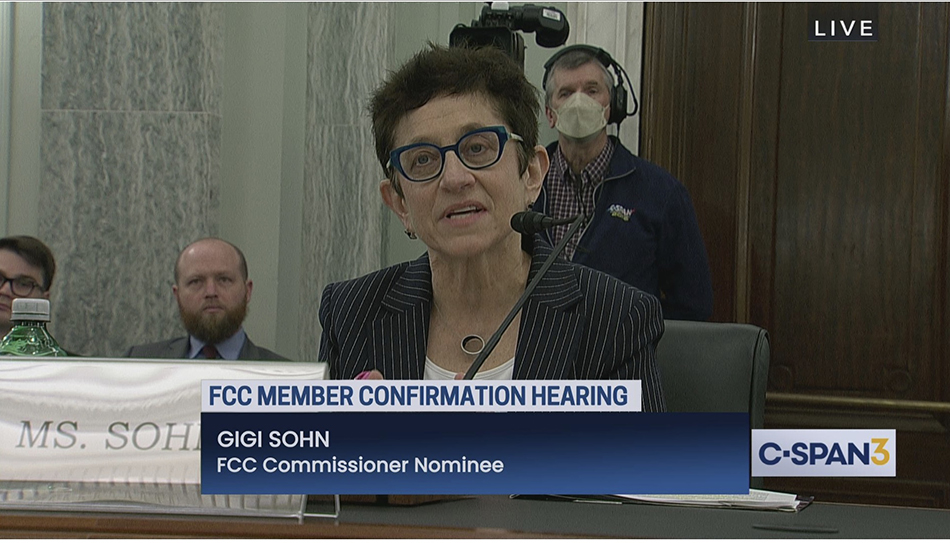Sohn to Senate: I Will Be Fair, Unbiased, Impartial FCC Commissioner
Faces second round of questions on her nomination to FCC seat

The smarter way to stay on top of broadcasting and cable industry. Sign up below
You are now subscribed
Your newsletter sign-up was successful
Federal Communications Commission nominee Gigi Sohn faced a strongly divided Senate Commerce Committee at the second hearing on her nomination to the agency‘s open seat as the pushback from Republicans on her nomination continued.
Democrats spent their time having her back while Republicans fired away over various issues. Both sides conceded her extensive communications experience and her reputation as a brilliant and effective public interest advocate, but that is where the agreement basically ended.
Also: Sohn Says She Has Been Subject of Unfair, False Attacks
While Democrats argued that the criticisms leveled by opponents of her nomination were part of a larger campaign by big media companies to "deadlock, disarm and disable" the FCC, Republicans used her offer to voluntarily recuse from retransmission consent and copyright issues related to shuttered TV-station streamer Locast raised multiple issues about bias stemming from her public advocacy background.
Republicans also cited tweets critical of Republicans, Fox News Channel and President Donald Trump. Sohn countered that she has tweeted both support and opposition to Republicans, though said in hindsight she could have expressed some of her criticism less harshly,
Committee chair Maria Cantwell (D-Wash.) said Sohn could not be more qualified with a demonstrated track record to convene stakeholders from both sides. Sen. Ed Markey (D-Mass.) said her public advocacy was a plus, not a minus.
Democrats said her public advocacy view would be an important one for the FCC, as would her groundbreaking role as the first openly gay FCC commissioner, which Cantwell called a milestone for diversity that was very important.
Cantwell conceded she had strong opinions that she expressed, but so did others who have been confirmed to the FCC. Former chairman Ajit Pai's former job for Verizon was held up as an example by Democrats, though the arguably more obvious example, former FCC chairman Tom Wheeler, who was former head of CTIA and NCTA--only got an oblique reference.
Sen. Roger Wicker (R-Miss.), who had asked for the second hearing on Sohn's nomination, said it was not about trying to obstruct the FCC, but her ability to retain impartial. He said he doubted that recusal resolved outstanding concerns about that impartiality and said that rising complications with her nomination raised the question of whether she was the best choice for the post given there were "many other candidates" who would not have to recuse themselves.
Sohn assured the committee that her voluntary recusal was temporary and limited and likely would not impact her work at the FCC.
Citing letters of concern from USTelecom and NCTA, Sen. Roy Blunt (R-Mo.) asked if she thought criticism of her nomination was tied by efforts by big media companies to obstruct FCC decisions, she said she thought there were "certain large companies" who would like to see the FCC deadlocked who have opposed her nomination from the beginning and saw her recusal--and her omission of a mention of Locast as the reason for the recusal, which she said she regretted--as an opportunity for further opposition.
Sen. Ted Cruz (R-Texas) suggested Sohn was part of some sweetheart deal settlement that was "stunning and disturbing. Sohn said the timing of the Locast settlement and her nomination were not in her control and that reports that the court had mandated a $32 million settlement that was later settled for $700,000 were not correct. The $700,000 had already been agreed to, but the $32 million language was added afterwards as an agreement between both sides--Locast and the networks--because the networks wanted to "scare away" any future Locasts.
Sohn said she could be fair, unbiased and "will always listen."
Other highlights:
Sohn said she never talked to anyone at the National Association of Broadcasters about her recusal, and pointed out that NAB has not shifted from its "neutral" position on her nomination. That came in response to suggestions there might have been some quid pro quo.
Also: NAB Raises Red Flag Over Gigi Sohn's Locast Directorship
Sohn said that, if confirmed, she expected she would support an item promoting more competition for MVPD service in multiple tenant entities, though she would have to review the record.
Sohn said she would welcome Congress to resolve the network neutrality issue of FCC authority over broadband to end the regulatory ping-ping game, but said that until then the FCC has the authority to act to adopt net neutrality rules, which she has advocated.
Sohn said that since her recusal was voluntary, she could rescind it if necessary, though she did not anticipate doing so.
Sohn said suggestions she would censor speech--stemming from the Fox News tweets and others comments as a private citizen and advocate--should be put to rest by support for her nomination from execs at conservative outlets One America and Newsmax, and her support from the head of Parents Television Council.
Sohn said that she had discussed her voluntary recusal with committee staff but that the White House opposed her.
Senators will have until February 14 to submit written questions to Sohn, after which she will have a week to respond. ■
The smarter way to stay on top of broadcasting and cable industry. Sign up below
Contributing editor John Eggerton has been an editor and/or writer on media regulation, legislation and policy for over four decades, including covering the FCC, FTC, Congress, the major media trade associations, and the federal courts. In addition to Multichannel News and Broadcasting + Cable, his work has appeared in Radio World, TV Technology, TV Fax, This Week in Consumer Electronics, Variety and the Encyclopedia Britannica.

